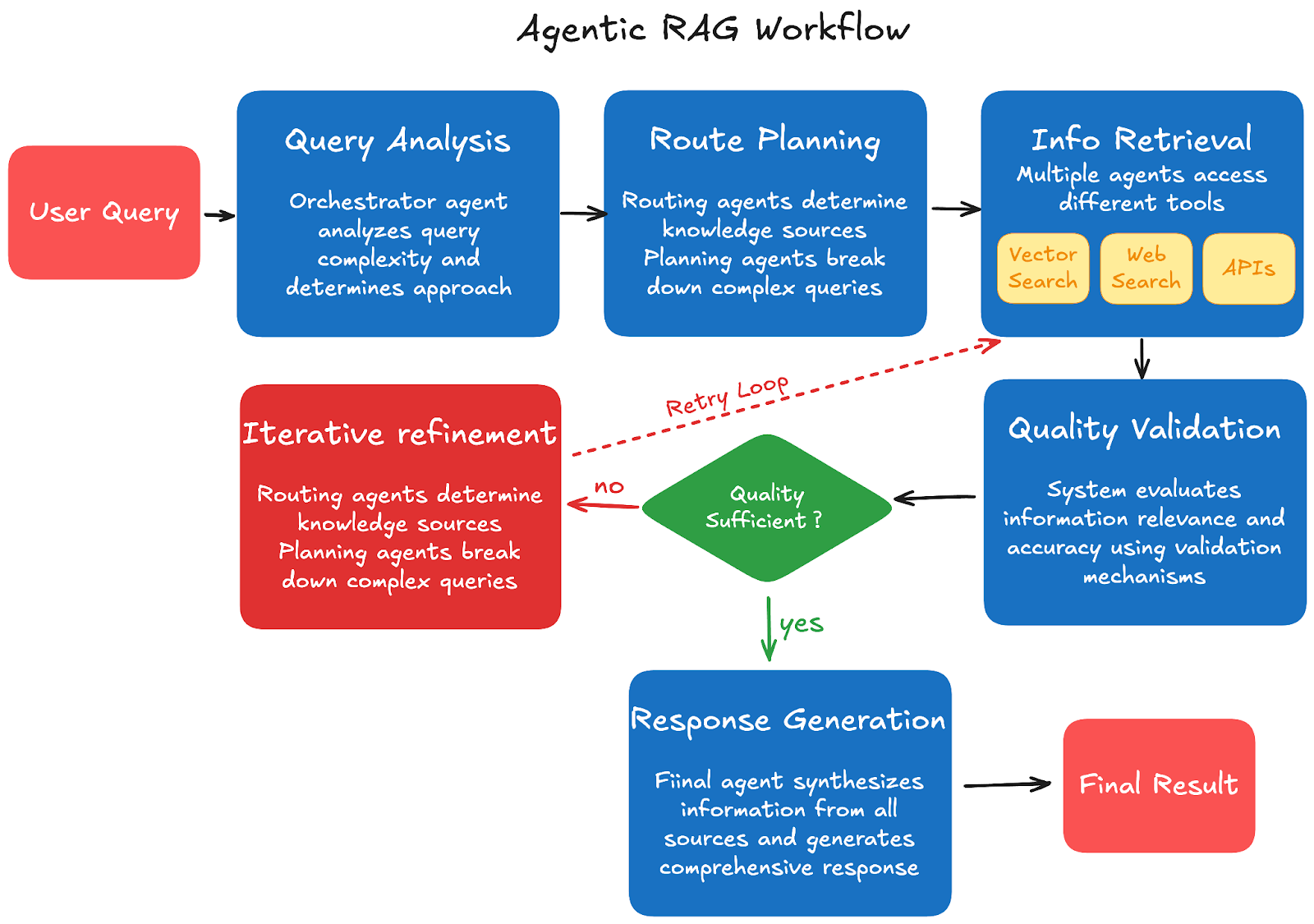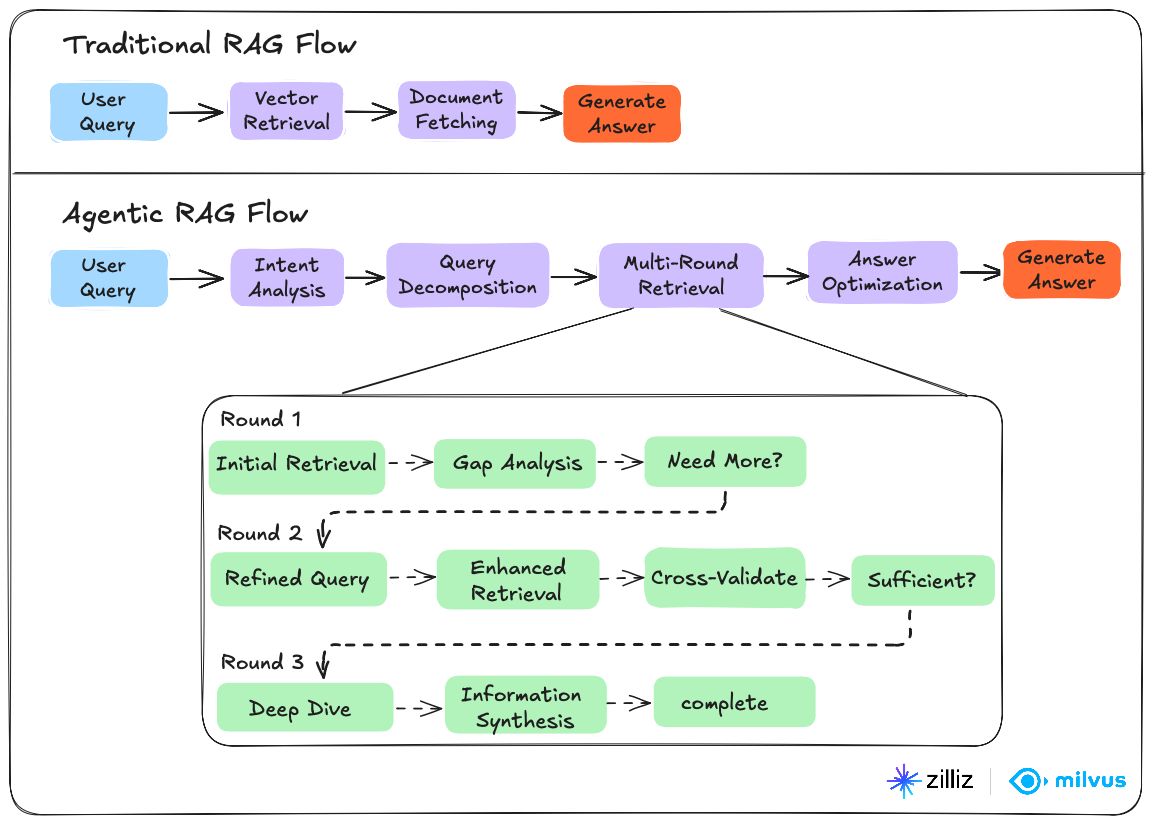Agentic RAG: Smarter AI Retrieval with Autonomous Agents
Agentic RAG: Smarter AI Retrieval with Autonomous Agents
Imagine having a research assistant who doesn't just search one database when you ask a question, but intelligently decides which sources to consult, validates the information they find, and even reformulates your question if necessary to achieve better results. This is exactly what agentic RAG brings to artificial intelligence systems.
While traditional Retrieval-Augmented Generation (RAG) systems significantly improved how AI applications access external knowledge, they operate like a single-track mind, limited to one knowledge source and a single retrieval attempt. Agentic RAG transforms this linear approach into an intelligent, adaptive system that can think, plan, and act across multiple information sources to deliver more accurate and comprehensive responses.
What is Agentic RAG?
Agentic RAG is an enhanced implementation of Retrieval-Augmented Generation that incorporates AI agents to orchestrate complex information retrieval and generation workflows. Unlike traditional RAG systems that follow a fixed sequence of retrieval and generation, agentic RAG employs intelligent agents capable of reasoning, planning, and making decisions about how to best answer user queries.
At its core, agentic RAG utilizes AI agents to facilitate retrieval-augmented generation, enhancing the RAG pipeline with adaptability and accuracy while enabling large language models to conduct information retrieval from multiple sources and handle more complex workflows.
These systems convert LLMs into AI agents, empowering them to utilize tools, functions, and external knowledge sources, thereby creating a more sophisticated approach to information processing than standard RAG implementations.
Key Features of Agentic RAG
Multi-Source Intelligence: The system can connect to multiple databases, including vector databases such as Milvus and Zilliz Cloud, as well as traditional SQL databases. Agents can simultaneously access internal documents, external APIs, web searches, and specialized databases based on the query requirements.
Adaptive Query Processing: AI agents can iterate on previous processes to optimize results over time. When initial results are insufficient, agents can reformulate queries, try different sources, or break complex questions into manageable sub-queries.
Intelligent Planning and Orchestration: Agents in this approach can plan and reason through tasks that require multiple steps and logical reasoning. A coordinator agent can assign specialized tasks to different retrieval agents, each optimized for specific data types or domains.
Quality Validation: Unlike traditional systems, agentic RAG includes built-in mechanisms for evaluating retrieved content. AI agents can iterate on previous processes to optimize results over time. This validation layer significantly reduces hallucinations and improves response accuracy.
Tool Integration: Retrieval agents with access to different retriever tools, such as: Vector search engine (also called a query engine) that performs vector search over a vector index (like in typical RAG pipelines), Web search, Calculator, Any API to access software programmatically, such as email or chat programs enable comprehensive information gathering beyond simple document retrieval.
How Does Agentic RAG Work
Agentic RAG operates through a sophisticated architecture that combines multiple AI agents with advanced reasoning capabilities. Here's how the system processes queries from start to finish:
Step-by-Step Workflow
Step 1: Query Analysis: User submits a query to the primary orchestrator agent, which analyzes the query complexity and determines the required approach. The system decides whether single or multiple retrieval steps are needed based on the query's scope and complexity.
Step 2: Route Planning: Routing agents determine which external knowledge sources and tools to use, while query planning agents break down complex queries into manageable sub-tasks. The system creates an execution plan based on available resources and the most efficient path to gather comprehensive information.
Step 3: Information Retrieval: Retrieval agents access different tools based on the execution plan, including vector search engines for document databases, web search for current information, APIs for specific software or service data, and calculators for computational tasks. Multiple agents can work simultaneously across different sources to maximize efficiency and coverage.
Step 4: Quality Validation: The system evaluates retrieved information for relevance and accuracy using built-in validation mechanisms. If content is insufficient or irrelevant, agents reformulate queries and validation mechanisms check for consistency across multiple sources to ensure reliable information quality.
Step 5: Iterative Refinement: The system determines if additional retrieval is necessary based on the quality and completeness of gathered information. Agents can re-query with refined search terms, and this process repeats until sufficient quality information is gathered to provide a comprehensive response.
Step 6: Response Generation: The final agent synthesizes information from all sources into a coherent response. It generates comprehensive answers using validated context and provides citations and source attribution when applicable to maintain transparency and credibility.
Agent Types and Roles
Routing Agents: Determine which external knowledge sources and tools are used to address user queries
Query Planning Agents: Process complex queries and break them down into step-by-step processes
ReAct Agents: Combine reasoning and action capabilities for dynamic workflow adaptation
Plan-and-Execute Agents: Handle multistep workflows independently without constant coordination
 Agentic RAG workflow.png
Agentic RAG workflow.png
Benefits and Challenges of Agentic RAG
Agentic RAG offers significant advantages over traditional approaches while introducing some operational considerations.
Benefits
Enhanced Accuracy: Multi-source validation and cross-referencing significantly reduce hallucinations and improve response reliability. The system's ability to verify information across multiple knowledge bases creates a robust fact-checking mechanism that traditional RAG cannot match.
Multi-Source Integration: Access to diverse knowledge bases, APIs, and external tools enables comprehensive information gathering from structured databases, web searches, calculators, and specialized software. This versatility allows the system to handle complex queries requiring information from multiple domains.
Iterative Refinement: Continuous improvement of response quality through multiple retrieval and validation cycles ensures that suboptimal initial results can be enhanced. The system learns from each iteration, reformulating queries and improving search strategies until satisfactory information quality is achieved.
Adaptive Problem-Solving: Proactive approach to complex queries with intelligent routing and dynamic workflow adjustment. The system can autonomously determine the best retrieval strategy, adapt to changing contexts, and handle unexpected scenarios without requiring manual intervention or extensive prompt engineering.
Challenges
Higher Costs: More agents and iterative processes require greater computational resources and token usage, potentially increasing operational expenses by 2-3x compared to traditional RAG. The multi-agent architecture demands more API calls, longer processing times, and additional infrastructure to support complex workflows.
Increased Latency: Multiple agent interactions, validation steps, and potential iteration cycles can significantly slow response times. Complex queries may require several rounds of retrieval and refinement, making the system less suitable for real-time applications that demand immediate responses.
Reliability Issues: Agents may struggle or fail to complete complex tasks, creating points of failure in the workflow. Coordination between multiple agents can become unstable, leading to incomplete responses, infinite loops, or conflicting decisions that require sophisticated error handling mechanisms.
Integration Complexity: Connecting diverse tools, knowledge sources, and managing multi-agent coordination requires sophisticated orchestration and extensive testing. The system architecture becomes significantly more complex than traditional RAG, demanding specialized expertise for deployment, maintenance, and troubleshooting.
Comparison of Agentic RAG with Traditional RAG
 Agentic RAG vs Traditional RAG.jpg
Agentic RAG vs Traditional RAG.jpg
| Feature | Traditional RAG | Agentic RAG |
|---|---|---|
| Data Sources | Single knowledge base | Multiple sources and external tools |
| Query Processing | One-shot retrieval | Multi-step, iterative approach |
| Validation | No built-in validation | Automated quality assessment |
| Adaptability | Static, rule-based | Dynamic, intelligent decision-making |
| Tool Access | Limited to vector database | APIs, web search, calculators, external services |
| Planning Capability | Simple retrieve-and-generate | Complex reasoning and task decomposition |
| Error Handling | Manual intervention required | Self-correction and retry mechanisms |
| Scalability | Limited by single source | Scales with additional agents and sources |
| Cost | Lower token usage | Higher computational overhead |
| Response Speed | Faster initial response | Variable, depending on complexity |
Use Cases of Agentic RAG
Enterprise Knowledge Management: Agent-powered RAG systems are excellent at looking at and retrieving information from heterogeneous enterprise data. Companies can deploy systems that automatically search across internal documents, databases, emails, and external market intelligence to answer complex business questions.
Customer Support Automation: Businesses wanting to streamline customer support services can use automated RAG systems to handle simpler customer inquiries. The agentic RAG system can escalate more demanding support requests to human personnel. The system can access product manuals, FAQ databases, customer history, and real-time status information to provide comprehensive support.
Healthcare Information Systems: Medical professionals can use agentic RAG to access patient records, medical literature, drug databases, and clinical guidelines simultaneously, enabling more informed decision-making while maintaining data privacy and compliance standards.
Financial Decision Support: Multiple RAG agents can perform calculations, find weather information, recommend stock and market trends, analyze data, and more. Financial analysts can query systems that combine internal portfolio data with external market information, regulatory filings, and economic indicators.
FAQs
Q: Can agentic RAG access multiple documents simultaneously?
A: An RAG agent can access, retrieve, and compare data in multiple supplied documents. The system excels at synthesizing information from diverse sources in a single response.
Q: How does agentic RAG differ from standard RAG?
A: A classic RAG can retrieve information from a single source, while an agentic RAG uses multiple agents to access and orchestrate data from diverse sources. Traditional RAG is reactive, while agentic RAG is proactive and intelligent.
Q: What frameworks can be used to build agentic RAG applications?
A: Several Python frameworks are available with ready-to-use components and tools for RAG agents' analytics and monitoring. These frameworks include Phidata, LangGraph, Swarm, Microsoft Autogen, etc.
Q: Is agentic RAG always better than traditional RAG?
A: Not necessarily. While agentic RAG optimizes results with function calling, multistep reasoning and multiagent systems, it isn't always the better choice. For simple, single-source queries, traditional RAG may be more efficient and cost-effective.
Q: Can agentic RAG work with different data types?
A: Yes, modern agentic RAG systems support multimodal processing, handling text, images, audio, and other structured and unstructured data formats.
- What is Agentic RAG?
- Key Features of Agentic RAG
- How Does Agentic RAG Work
- Benefits and Challenges of Agentic RAG
- Comparison of Agentic RAG with Traditional RAG
- Use Cases of Agentic RAG
- FAQs
Content
Start Free, Scale Easily
Try the fully-managed vector database built for your GenAI applications.
Try Zilliz Cloud for Free